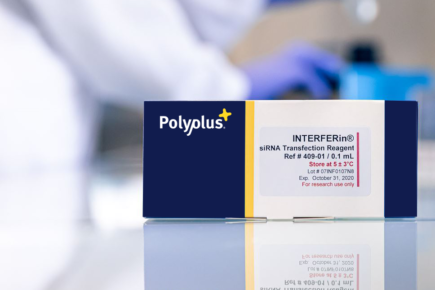INTERFERin® provides very high silencing efficiency already at 1 nM siRNA and can be used in a wide variety of adherent and suspension cells....

We use cookies to help you navigate efficiently and perform certain functions. You will find detailed information about all cookies under each consent category below.
The cookies that are categorized as "Necessary" are stored on your browser as they are essential for enabling the basic functionalities of the site. ...
Necessary cookies are required to enable the basic features of this site, such as providing secure log-in or adjusting your consent preferences. These cookies do not store any personally identifiable data.
Functional cookies help perform certain functionalities like sharing the content of the website on social media platforms, collecting feedback, and other third-party features.
Analytical cookies are used to understand how visitors interact with the website. These cookies help provide information on metrics such as the number of visitors, bounce rate, traffic source, etc.
Advertisement cookies are used to provide visitors with customized advertisements based on the pages you visited previously and to analyze the effectiveness of the ad campaigns.
High-Throughput Screening (HTS) is widely used in pharmaceutical industry, basic and translational research to discover new chemical compounds and study biological processes. HTS relies on robotic automation, liquid handling devices and bioinformatics for data analysis to simultaneously process a very large number of cell-based tests. Such automated cell-based screenings can be used to test various nucleic acids, multiple cell variants or culture conditions and treatments, at large or very large scale, in order to rapidly generate results on cell banks or biologics and chemical libraries.
High-throughput screening bioassays are almost exclusively conducted in the microtiter plate format (96, 384 or 1536 wells) which is the standard format of miniaturization. HTS allow researchers to use advanced systems such as cell culture microplate incubators, automated liquid handling devices and fluorescence or absorbance plate readers to 1) grow cells in appropriate and controlled culture conditions, 2) transfect cells and run the designed experiments and 3) acquire the output results in an automated manner.
High-throughput cDNA libraries screening is a valuable tool to study the structure, expression and regulation of genes in cultured cells, but also to study protein interactions and functions. jetPEI® is a transfection reagent ensuring very reproducible results, hence being particularly well suited for automated or manual HTS using DNA. Three jetPEI® protocols are available: reverse, batch and forward.
High-throughput RNA interference screening has emerged as a method of choice to setup genome-scale gain/loss of function screenings in cultured cells. INTERFERin® is a siRNA transfection reagent that can be used for high throughput screening applications providing great silencing efficiency, excellent reproducibility and high cell viability with very low amounts of reagent.